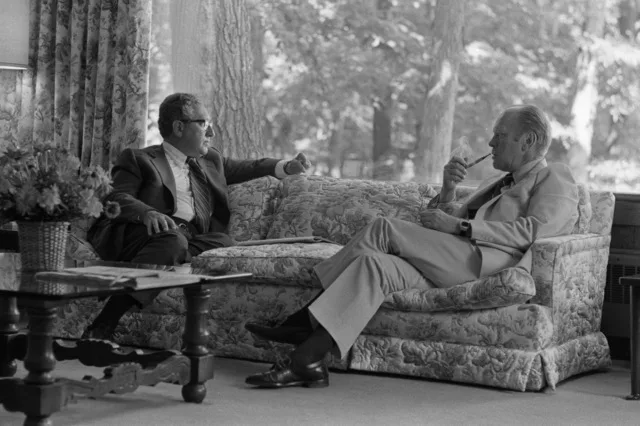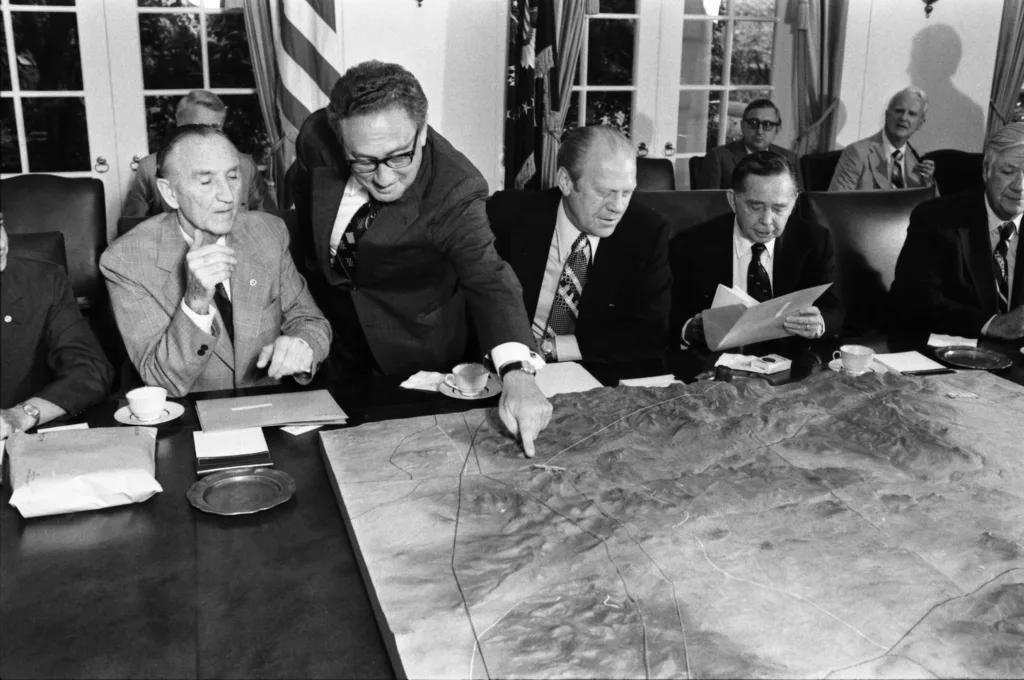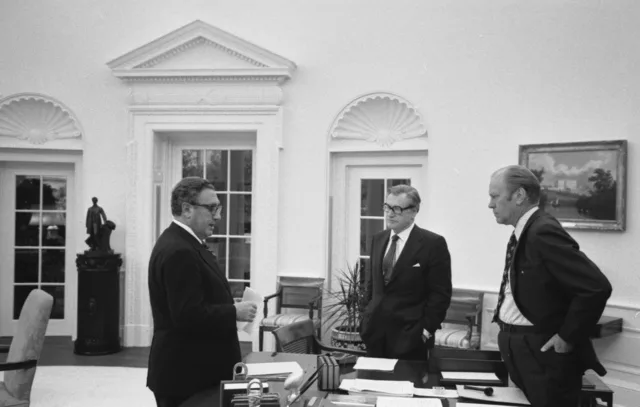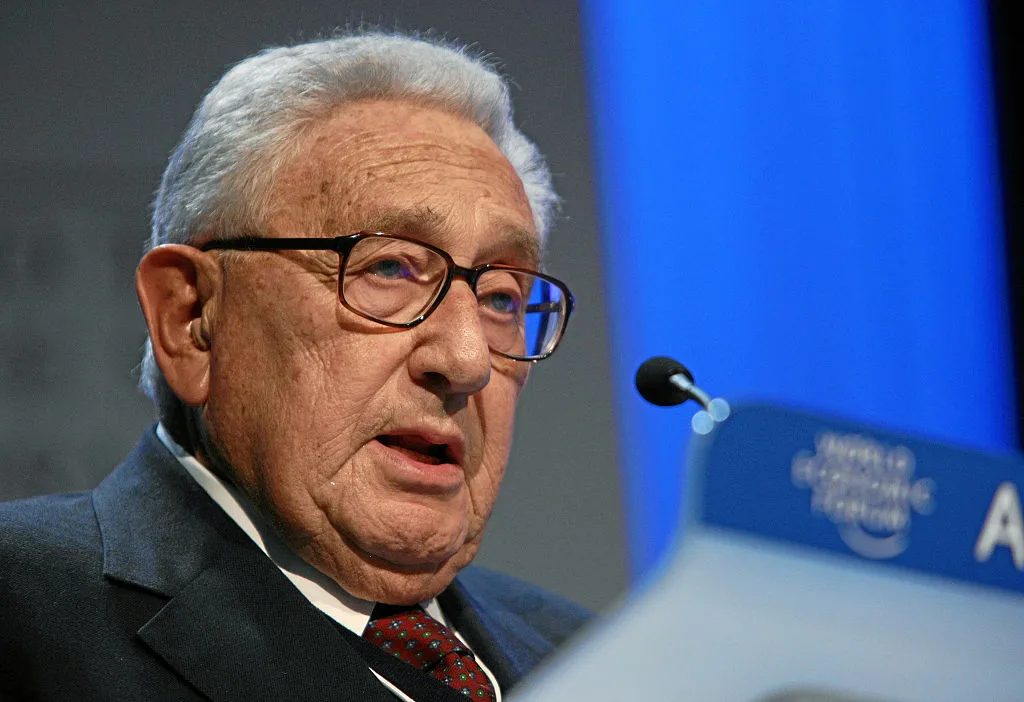Henry Kissinger, a prominent American politician of the Cold War era, who played a pivotal role in opening doors for Washington with China, negotiating arms control agreements with the Soviet Union, and aiding in ending the Vietnam War, has passed away at the age of 100.
Henry Kissinger, a German-born Jewish refugee whose career transitioned from academia to politics, remained an active voice in foreign policy in his later years. He breathed his last on Wednesday at his home in Connecticut, according to his geopolitical consultancy firm, Kissinger Associates Inc.
In the tumultuous 1970s, amid the Cold War, Henry Kissinger reached the pinnacle of his powers, serving as the National Security Advisor and Secretary of State under Republican President Richard Nixon. After Nixon’s resignation during the Watergate scandal in 1974, he continued as Secretary of State under President Gerald Ford.
Initiating diplomatic relations with China, historic American-Soviet arms control talks, expanding relations between Israel and its Arab neighbors, and contributing to the resolution of the Vietnam War were among Kissinger’s significant contributions.
While many lauded Kissinger for his brilliance and political acumen, others criticized him, especially for his support of authoritarian regimes in Latin America. In subsequent years, attempts to arrest him or investigate his past American foreign policy were made by some countries.
He was awarded the Nobel Peace Prize in 1973 for ending American involvement in the Vietnam War, but it remains one of the most controversial prizes to date. Two members of the Nobel Committee resigned in protest over the selection due to questions about secret American bombings in Cambodia. The chosen North Vietnamese politician, Le Duc Tho, declined the award.

As condolences pour in from around the world, Beijing referred to him as the “good old friend of the Chinese people”, recognizing his historic contributions to normalizing relations between the two nations.
Russian President Vladimir Putin praised Henry Kissinger as a “wise and far-sighted statesman”, while Israeli Prime Minister Benjamin Netanyahu described his meetings with Henry Kissinger as “masterclasses in statesmanship”.
With his distinctive German-inflected voice, Henry Kissinger never shied away from expressing his opinions. Ford once called him the “Super Secretary of State” but also acknowledged his cautiousness and self-confidence, saying, “Henry never made a mistake in his mind”.
Ford, reflecting on Kissinger’s thin skin and self-assurance, remarked before his own death in 2006, “As far as I know, of all the public figures I’ve known, he had the thinnest skin”.
Harvard Luminary: Henry Alfred Kissinger
Born on May 27, 1923, in Fürth, Germany, Henry Kissinger embarked on an extraordinary journey from escaping the Nazi campaign against European Jews in 1938 to joining his family in the United States.
Adopting the name Henry, Kissinger became a naturalized American citizen in 1943. He served in the European theater during World War II, participated in Harvard University’s scholarship program, earning his doctoral degree in 1954, and remained associated with the institution for the next 17 years.
During most of this time, Kissinger worked as an advisor to government agencies, including a stint in 1967 when he served as an intermediary for the State Department in Vietnam. He utilized his connections with President Lyndon B. Johnson’s Democratic administration to provide information about the Nixon-Kissinger plans for peace talks in Paris.

When Nixon’s commitment to ending the Vietnam War aided their victory in the 1968 presidential election, Kissinger was appointed as the National Security Advisor.
However, the process of “Vietnamization” – transferring the burden of the war from American forces to South Vietnam – was long and bloody, involving extensive American bombing, mining of North Vietnamese harbors, and bombing raids in Cambodia.
In 1972, Henry Kissinger declared that “peace is at hand” in Vietnam, but the Paris Peace Accords, signed in January 1973, were somewhat more than an introduction to the final communist takeover in the South.
Apart from his role as the National Security Advisor during this time, Kissinger was named Secretary of State in 1973 – granting him unbridled authority in foreign affairs.

The thirty-three days of shuttle diplomacy between Jerusalem and Damascus assisted in brokering a long-standing disengagement agreement in the Israeli-occupied Golan Heights between Israel and Syria.
In an effort to reduce Soviet influence, Kissinger made trips to his main communist adversary, China, engaging in two secret missions, including a clandestine journey to meet Prime Minister Zhou Enlai. The result was the historic summit meeting in Beijing with Chairman Mao Zedong and, ultimately, formalizing relations between the two nations.
Diplomatic Dealings: Henry Kissinger’s Strategic Maneuvers
As Secretary of State, Kissinger journeyed to Vladivostok in 1974 with President Ford, engaging in crucial discussions with Soviet leader Leonid Brezhnev. They laid the groundwork for a strategic arms agreement, tempering the tensions between the United States and the Soviet Union.
Kissinger’s diplomatic finesse had its limits. In 1975, his attempts to broker peace between Israel and Egypt in the second phase of disengagement in Sinai proved unsuccessful.
Facing heavy criticism for leaning towards Pakistan during the 1971 India-Pakistan war, both Nixon and Kissinger had to confront allegations of favoritism. Kissinger was even quoted using derogatory language against Indians, a comment he later expressed regret for.
Similar to Nixon, Kissinger harbored concerns about the spread of leftist ideologies in Western Hemisphere. In the ensuing years, deep distrust towards Washington was cultivated among many Latin Americans due to their reactions to Kissinger’s actions.
In 1970, he orchestrated a plot with the CIA to overthrow democratically elected Chilean President Salvador Allende, who was a Marxist. In a memorandum after the bloody coup in Argentina in 1976, he stated that military dictators should be encouraged.
When Ford lost to Democrat Jimmy Carter in 1976, Kissinger’s days in governmental power largely came to an end. The next Republican in the White House, Ronald Reagan, distanced himself from Kissinger, perceiving him as outside of his conservative electoral base.
Post-government service, Kissinger established a high-priced, high-powered consulting firm in New York, providing advice to the world’s corporate elite. He worked on company boards, contributed to various foreign policy and security forums, authored books, and became a regular media commentator on international affairs.
